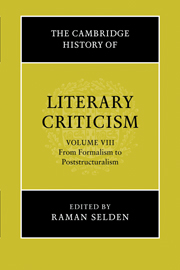Book contents
- Frontmatter
- Introduction
- 1 Russian Formalism
- STRUCTURALISM: ITS RISE, INFLUENCE AND AFTERMATH
- 2 Structuralism of the Prague School
- 3 The linguistic model and its applications
- 4 Semiotics
- 5 Narratology
- 6 Roland Barthes
- 7 Deconstruction
- 8 Structuralist and poststructuralist psychoanalytic and Marxist theories
- READER-ORIENTED THEORIES OF INTERPRETATION
- Bibliography
- Index
- References
2 - Structuralism of the Prague School
from STRUCTURALISM: ITS RISE, INFLUENCE AND AFTERMATH
Published online by Cambridge University Press: 28 March 2008
- Frontmatter
- Introduction
- 1 Russian Formalism
- STRUCTURALISM: ITS RISE, INFLUENCE AND AFTERMATH
- 2 Structuralism of the Prague School
- 3 The linguistic model and its applications
- 4 Semiotics
- 5 Narratology
- 6 Roland Barthes
- 7 Deconstruction
- 8 Structuralist and poststructuralist psychoanalytic and Marxist theories
- READER-ORIENTED THEORIES OF INTERPRETATION
- Bibliography
- Index
- References
Summary
The groundwork of structural poetics laid by the Russian Formalists was developed into the first system of twentieth-century literary structuralism by scholars of the Cercle linguistique de Prague (Prague Linguistic Circle – PLC). The personal and theoretical links between the Russian and the Prague schools are well known. Jan Mukařovský, the most prominent literary theorist of Prague, acknowledged that the conceptual system of his first major work – the May monograph of 1928 – originated with the Russian Formalists (Kapitoly, II, p. 12). Later on, in his review of the Czech translation of Shklovsky's Theory of Prose (published in 1934) Mukařovský summed up not only the Czech indebtedness to, but also the Czech criticism of, early Russian Formalism (‘K českému překladu’, Kapitoly, I, pp. 344–50; Steiner, The Word, pp. 134–42). The first president of the PLC, Vilém Mathesius, surveying the first ten years of the Circle's activities in 1936, highly commended the contribution of Russian scholars, but emphasized the domestic sources of Prague School thought. He strongly protested the claim that the work done in Prague was nothing more than an application of Russian linguistic and literary-theoretical trends; the ‘working symbiosis’ achieved in the Circle is a ‘mutual give and take’ (‘Deset let’, pp. 149ff.; cf. Renský, ‘Roman Jakobson’, p. 380). In the same year, Roman Jakobson, who was a member of both Schools, spoke as well of a ‘symbiosis of Czech and Russian thought’, but pointed also to influences from Western European and American science.
- Type
- Chapter
- Information
- The Cambridge History of Literary Criticism , pp. 31 - 57Publisher: Cambridge University PressPrint publication year: 1995

